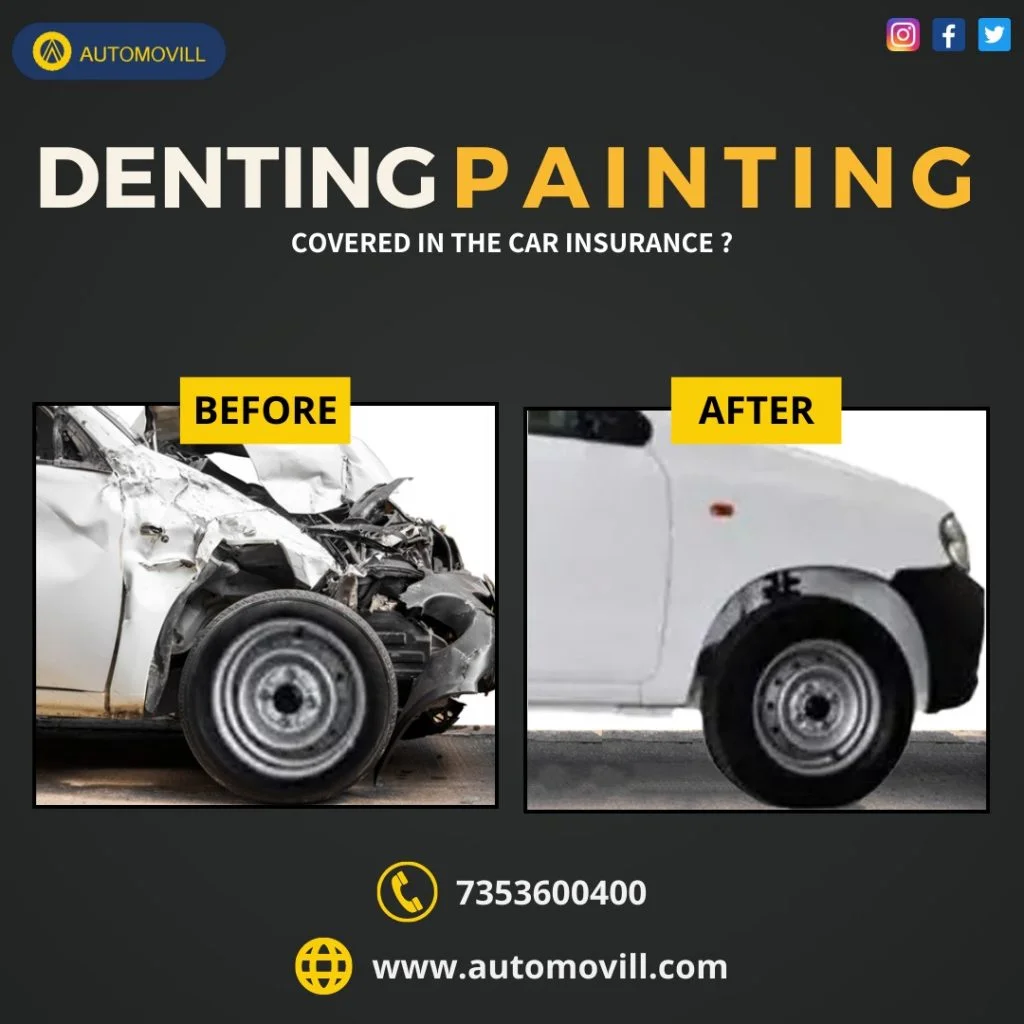
Buying car insurance has never been an optional thing for many of us who buy a new car. With daily usage, it becomes impossible not to get a few scratches and dents on our car. The question remains, “Is denting and painting damage covered in the car insurance ??“
Does it cover dent-paint damages?
If you have comprehensive coverage, you might be able to file a claim for minor paint or dent damage to your automobile. However it’s not always a smart idea to do so. In most cases natural degradation, wear and tear due to weather conditions can’t be claimed.
Should you make insurance claim for small damages?
You should never hurry to file an insurance claim for a small dent or paint job on your automobile. For each year without filing a claim, you are eligible for a No-Claim Bonus (NCB). If you go several years without filing a claim company can lower your premium cost by as much as 50%.
It will probably save you more money in the long run to handle small repairs without involving insurance company. If you can pay for repairs out of pocket or the damage is less than your NCB. It is sensible to not apply for any claim. Numerous minor vehicle-related issues, like scratches, small dents, and other natural harm could be repaired at a reasonable price.
Factors to claim insurance at workshop
No Claim Bonus percentage:
A “No Claim Bonus,” often known as an NCB, is applied to each renewal of a policy by an insurance owner who had no claims during the preceding year. When you renew your insurance coverage, you can take advantage of NCB, which is effectively a discount on your insurance payment for the next term.
You can accrue up to a 50% reduction on premiums if you go several years without filing any claims. If you apply for an insurance claim for a denting or painting job, it won’t be beneficial as the amount of money you will get for repairs will be much lesser than the NCB discount, if you don’t claim it.
Magnitude of damage:
As a general guideline, only file an insurance claim if the automobile needs multiple repairs, painting, or denting that will undoubtedly cost more than the NCB bonus offered by your insurance provider.
In addition to this, whether a third party is engaged or not is a crucial factor. For instance, there is no need to utilize your insurance coverage to pay for repairs if you ran into a wall while parking your car. However, you should consider filing an insurance claim if you are in an accident with a third party. This is because the insurance company will pay for the harm your automobile would have done to the third party.
Actual incident:
You are only permitted to make an insurance claim for damages that are the consequence of a single event. It means that you are not permitted to claim for damages that happened from different accidents. When filing an insurance claim you will need to provide a detailed account of the accident’s circumstances. If any discrepancy found, it is quite probable that the claim will be denied.
Where?
When choosing a body workshop for your car, the typical possibilities come into play are: Authorized workshops vs. Multi-brand workshops. Following are the factors that you should consider:
Work quality and Proper equipment:
Select a paint workshop that offers a warranty, excellent painting services (will rectify any paint color mismatches, bubbles, etc. at no cost) and has a proper painting area with all the required equipment. Some businesses provide a warranty of up to a year on the work they perform. By making such guarantees, the business positions itself as more trustworthy to complete your repairs.
Cash-less insurance claims
Your insurance company pay straight to the workshop in the event of cashless claims with no worries. It will pay the workshop directly for the outstanding balance. It goes without saying that you should only go to workshops with whom your insurance company has a tie-up for cashless claims. Additionally, it takes less time to approve insurance surveys and claims when you visit a workshop which has tie up with your insurance provider.
Cost
It is a widespread misperception that you should visit an “approved and authorized” repairing workshop since you will already be claiming insurance. If you have a Zero Depreciation policy, then the choice is undoubtedly justifiable. The level of customer liability at an approved workshop, however, may be larger if the vehicle has Comprehensive coverage because they frequently replace (rather than repair) damaged parts of your vehicle.
For instance, there is a significant possibility that a certified workshop will replace the rear bumper rather than attempt to repair it if it has been damaged. In such an instance you would be responsible for paying up to 50% of the part’s price.
Conclusion
If you need a small denting and painting repair, we would advise you not to file a car insurance claim. In the long run, it is more cost-effective to pay for these repairs yourself. The “No Claim Discount (NCD)” offered by the insurance provider is a key factor in this decision. Your insurance provider can offer you a reduction of up to 50% on your insurance premium costs if you go several years without filing any claim.
